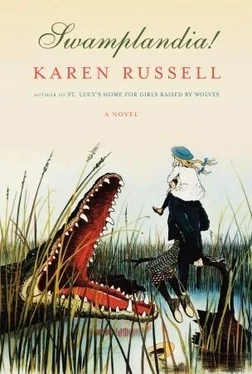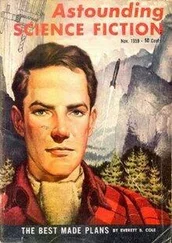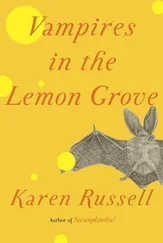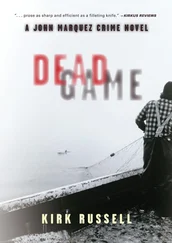So he hadn’t sent any checks home yet, but he had swiped a stack of greeting cards from the World of Darkness gift store. “I’m Having a Whale of a Time!” read one: a bug-eyed black woman in her seventies or eighties was caught on camera sliding into the Leviathan, her blue wig a full inch above her head. “It’s Hell Without You!” read another, this one of a very confused-looking girl in a cherry-pink party dress descending into a hole.
Dear Ava—
Dear Ossie—
He went on accumulating beginnings.
CHAPTER SEVEN. The Dredge Appears
Now that the Chief was gone on his business trip and we’d temporarily closed Swamplandia! we girls were the queens of the island. The Seths followed the sun around the Pit, the moon continued to whir. I could sleep into the deep yolk of any afternoon, wear my dirty pajamas to the Pit, stow away on the Library Boat and read murder mysteries until four in the morning. I could watch the World of Darkness commercials with the volume cranked. All this possibility made me dizzy with a strange kind of grief. I wasn’t sleeping right. On the nights that Ossie didn’t come home, I dragged a blanket down to the sofa and left our whole house lit up like a ship.
One Saturday, four or five days after the Chief’s depature, in the late red light of June, a black shape appeared on the westernmost edge of our park. At first it was just a mote that I glimpsed between the bayhead hammocks, floating in the blue eye of the island like a speck in jelly. I blinked and rubbed my eyes and the blot stayed put. Then Ossie said that she could see the blot, too.
Ossie and I were a mile from the house, walking the limits of the touristed park. After the Last Ditch the trail became impenetrable palmetto scrub. All day we had been hunting for melaleuca saplings.
Water once flowed out of Lake Okeechobee without interruption, or interference from men. Aspiring farmers wanted to challenge her blue hegemony. All that rich peat beneath the lakes was going to waste! Melaleuca quinquenervia was an exotic invasive, an Australian tree imported to suck the Florida swamp dry. If you were a swamp kid, you were weaned on the story of the Four Pilots of the Apocalypse, these men who had flown over the swamp in tiny Cessnas and sprinkled melaleuca seeds out of restaurant salt and pepper shakers. Exotic invasives, the “strangler species” threatened our family long before the World of Darkness. The Army Corps of Engineers had planted thousands of melaleuca trees in the 1940s as part of their Drainage Project, back when the government thought it was possible to turn our tree islands into a pleated yellowland of crops. I was raised to be suspicious of the Army Corps of Engineers, with good reason. The dikes and levees that the Army Corps had recommended for flood control had turned the last virgin mahogany stands into dust bowls; in other places, wildfire burned the peat beds down to witchy fingers of lime.
Now the melaleucas had formed an “impermeable monoculture.” That meant a forest with just one kind of tree in it. Most of the gladesmen had long ago abandoned the dream of farming their islands. You could sum up the response of the Army Corps of Engineers and the swamp developers in one word, said our dad: “Oops!” Forest fires raged and burned the swamp down to peat. Frosts came and a man could break his knife trying to slice through a glade tomato. By 1950, the dream of drainage was largely dead. The Army Corps of Engineers changed its objective from draining the “wasteland” of the swamp islands to saving them. Unfortunately for my family, the melaleucas were still root-committed to the old plan, the drainage scheme. They swallowed fifty acres a day. Back in May, Kiwi had discovered a punky infestation behind the Gator Pit: saplings the width of mop handles. The Bigtree men swung axes into them, bled them, flooding the world with the smell of camphor. We kept cutting them down, and the earth kept raising them. It was a haywire fertility, like a body making cancer.
Why, the swamp is writing her own suicide note! A visiting botanist looked down and said this to me once on an airboat ride, running a thumb around the pinky-gold rim of his glasses as if he were extraordinarily pleased with this phrase. We’d taken a team of five Corps engineers, hydrologists, and botanists out to a hammock behind West Lake where the new forest had come in so thick that “a chubby wood rat couldn’t get through it.” The afternoon was full of these “Stanley, look!” kinds of comments from the scientists. Like our dereliction was a zoo for them.
“Fifty trees to an acre, my God ” was how Stanley the stunned hydrologist summed up the problem; he’d taken a photograph for a journal article.
“Do you folks believe in God?” my dad had asked. “Because that’s who I’m praying to now. I’m through waiting on you people.” The Chief said that the Army Corps had a funny amnesia about the fact that our crises — the wildfires, the melaleuca stands, the fatal flooding in the gravity canals — had each originated as a Corps blueprint.
“Die, melaleuca!” I’d been hollering all afternoon, swinging my paintbrush. Ossie was cutting the saplings down, and I was painting herbicide onto the stumps. We were tree warriors, I told Ossie. We had come to the Last Ditch for a massacre.
“This is a pretty boring massacre,” said my sister. “When is lunch?” I was stirring the bucket of vitreous poisons when I looked up and saw the shape: something black, liquefying and resolving behind the reddish grain of the pines.
It took us five minutes to get through the scrub. Spanish moss and pineapple-like bromeliads waved in tall curtains from the bay trees. The shape kept changing dimension on us between the trunks; I thought it might be a house of some kind. But how could a whole house wash up here?
“HELLO!” we both called into the Last Ditch.
“It’s a boat after all, Ava …,” my sister shouted, running ahead. But not a boat like we’d ever seen. It was a twenty-five- or twenty-six-foot vessel with a cuddy cabin and a maze of ropes that was in a process of solving itself, the pulleys lying on the stern where some knot had collapsed; a thin crane with rusting struts was attached to its bow. Its dipper bucket was thirty feet above us, like a dinosaur’s little yellow skull. Tall palms stretched around the latticed crane as if in competition. My sister punched straight through the willow heads and pulled me after her.
“Hello?” we asked, more quietly now.
“Ava!” said Ossie. “It’s a dredge. ”
“Oh.” For some reason the word made my heart speed. Now that she’d found the name for it I saw immediately that Ossie was right — this boat had a bucket and cables and a crane arm, presumably for bringing up the crumbling muck and digging a road or canal. We had black-and-white pictures of them hanging in our museum: The Dredge and Fill Campaign, 1886–1942.
Ossie was already moving toward it. The canal had swollen to seven or eight feet and twisted and hissed now like an unbungalowed snake; the recent rains would have driven it even higher. I guessed that the dredge would have continued on, too, but it had gotten hung up in the crooked pincers of the mangroves. Something about the angle of its entry made me think of a key that had been jammed hard into the wrong lock. Several buzzards sat on the dipper bucket. Once I noticed the birds I started to see them everywhere: one was slim-winged on one of the crane’s ladders. One was eating a squirrel on the hull. There was something canny and bald about their attention, their tiny wet eyes. I felt like these buzzards had been waiting here for us, for a long time.
Ossie didn’t seem to notice them; she was intent on reaching the boat. She took the first-moon-man leap over the canal and I followed. The deck was a dull, uneven black. Slick. We got the cuddy cabin door to open, which took a lot of one-two-three!ing and team wrenching. When the door came loose, colors flooded over us. I screamed, too, and covered my face with my arms, and if Ossie hadn’t caught me I might have fallen into the wedge of canal between the shoreline and the boat. In that second I knew that I’d been wrong this whole time: that my sister was psychic, that the whole world was haunted, and now a ghost was tuning itself like a luminous string above me. Then the ghost broke into particulates of wings.
Читать дальше












